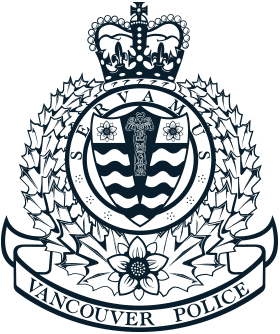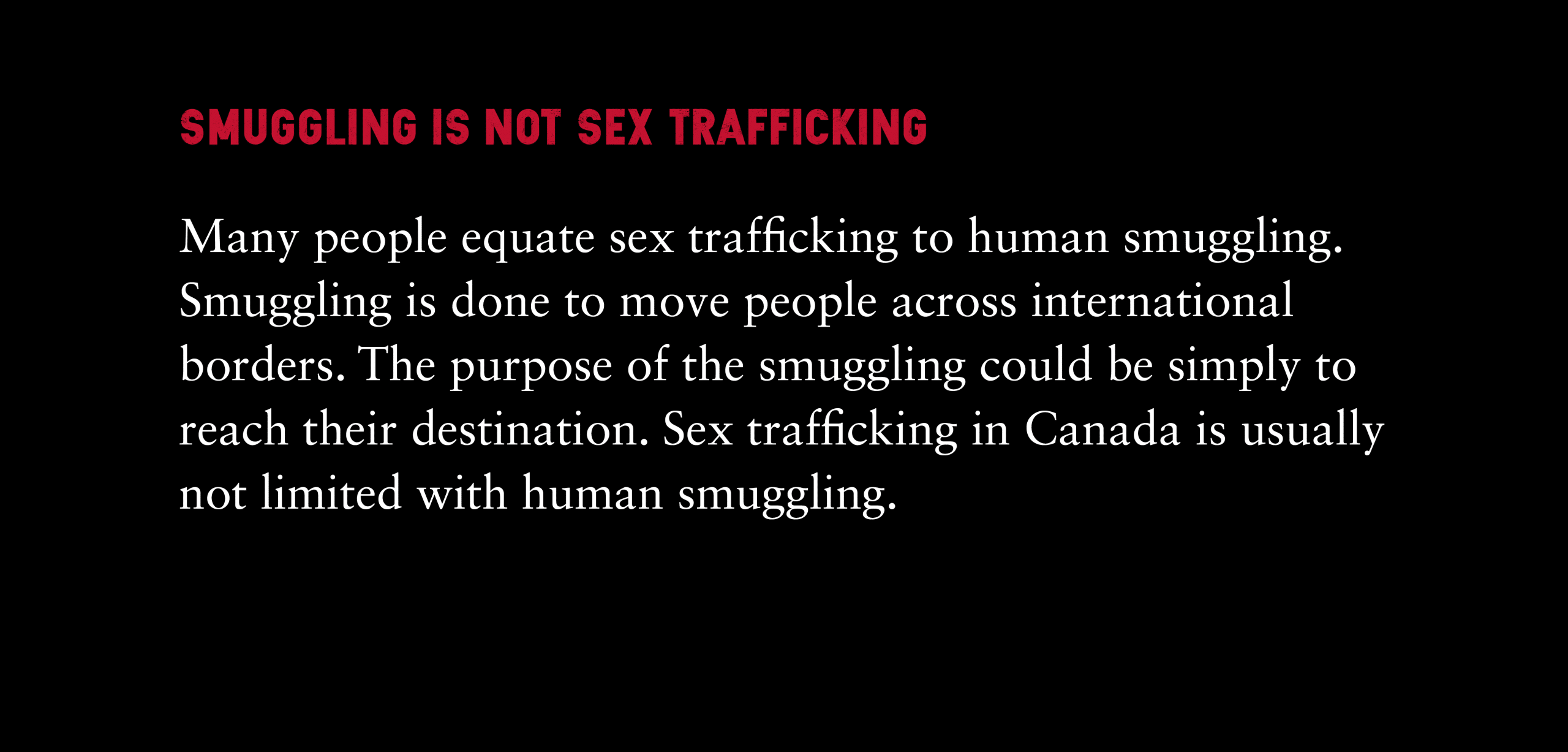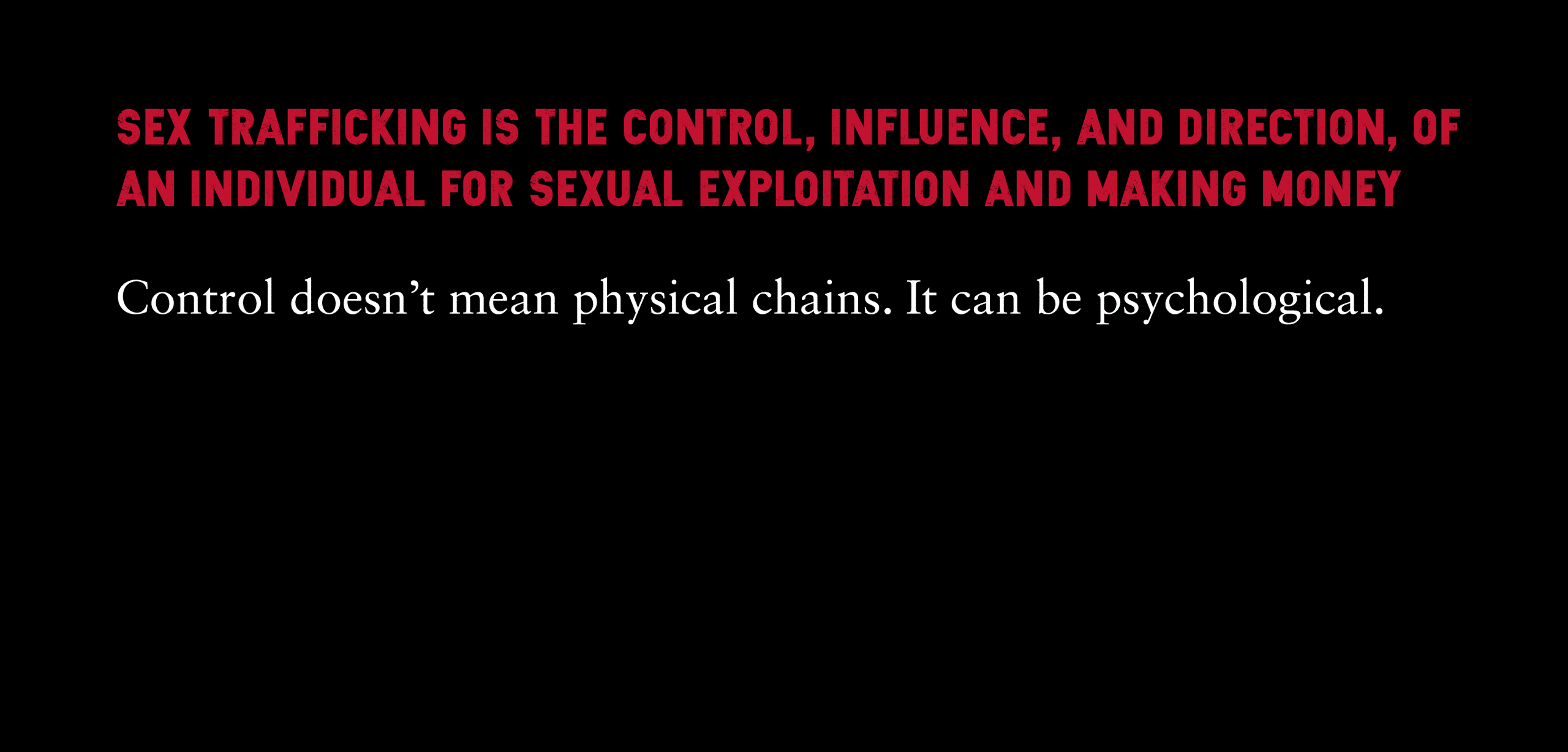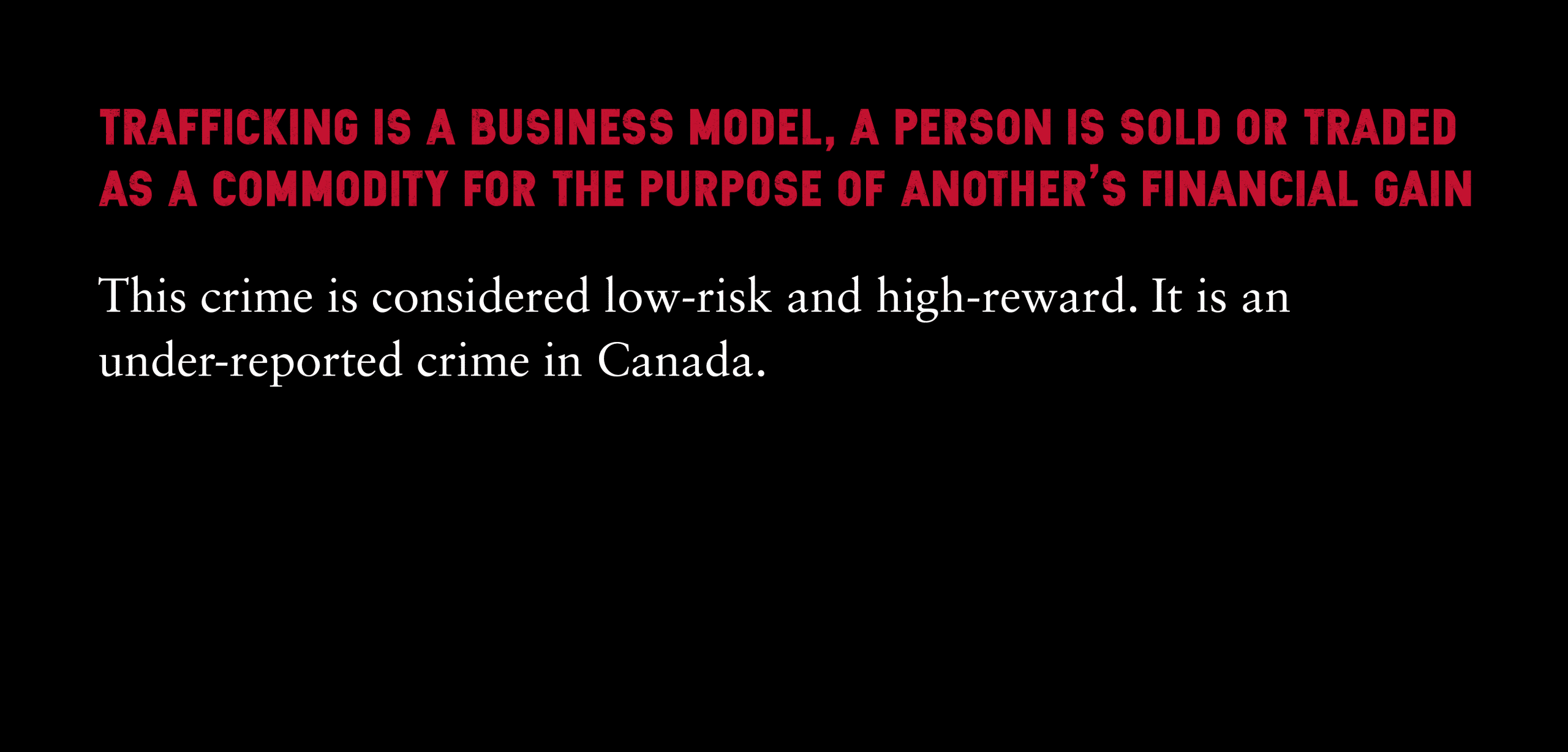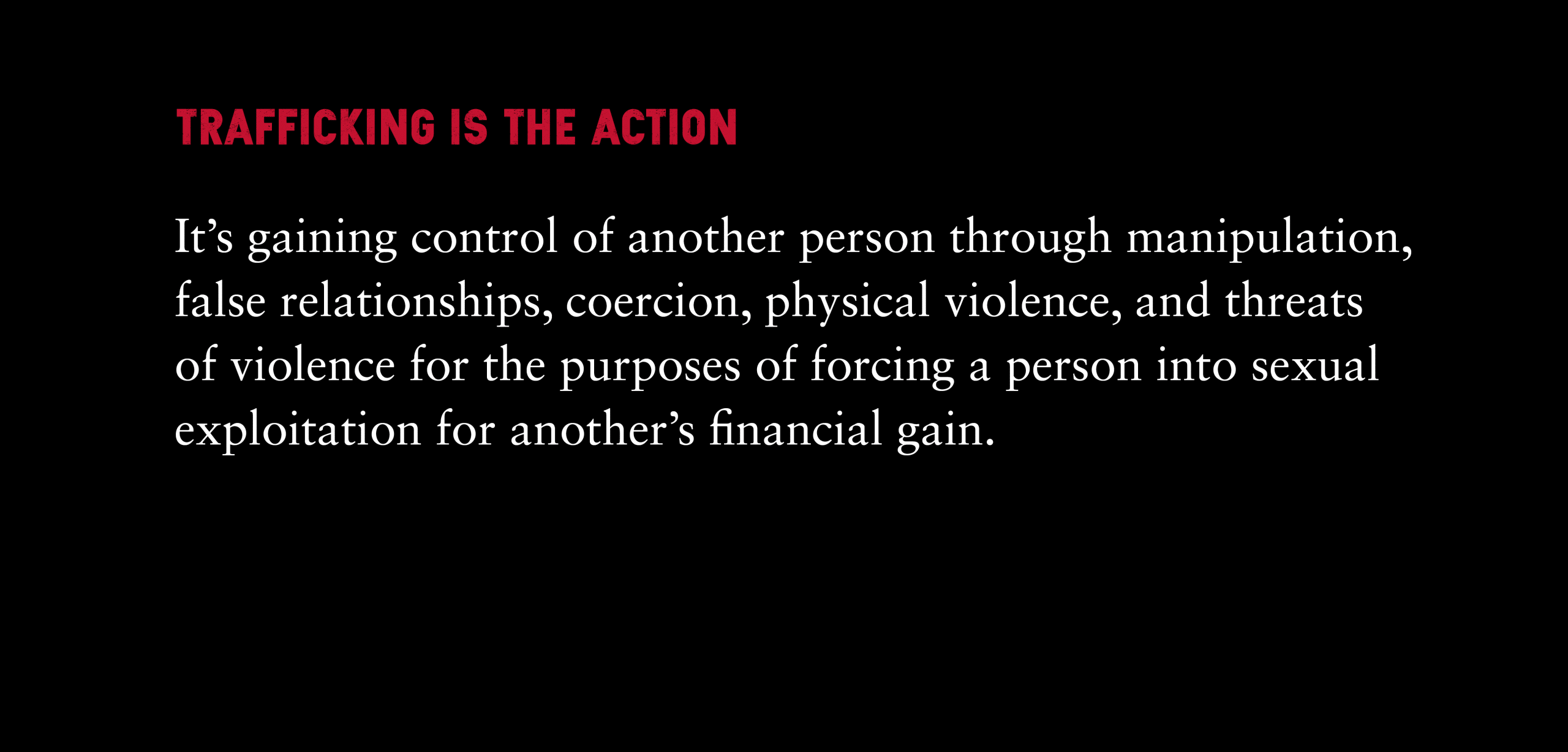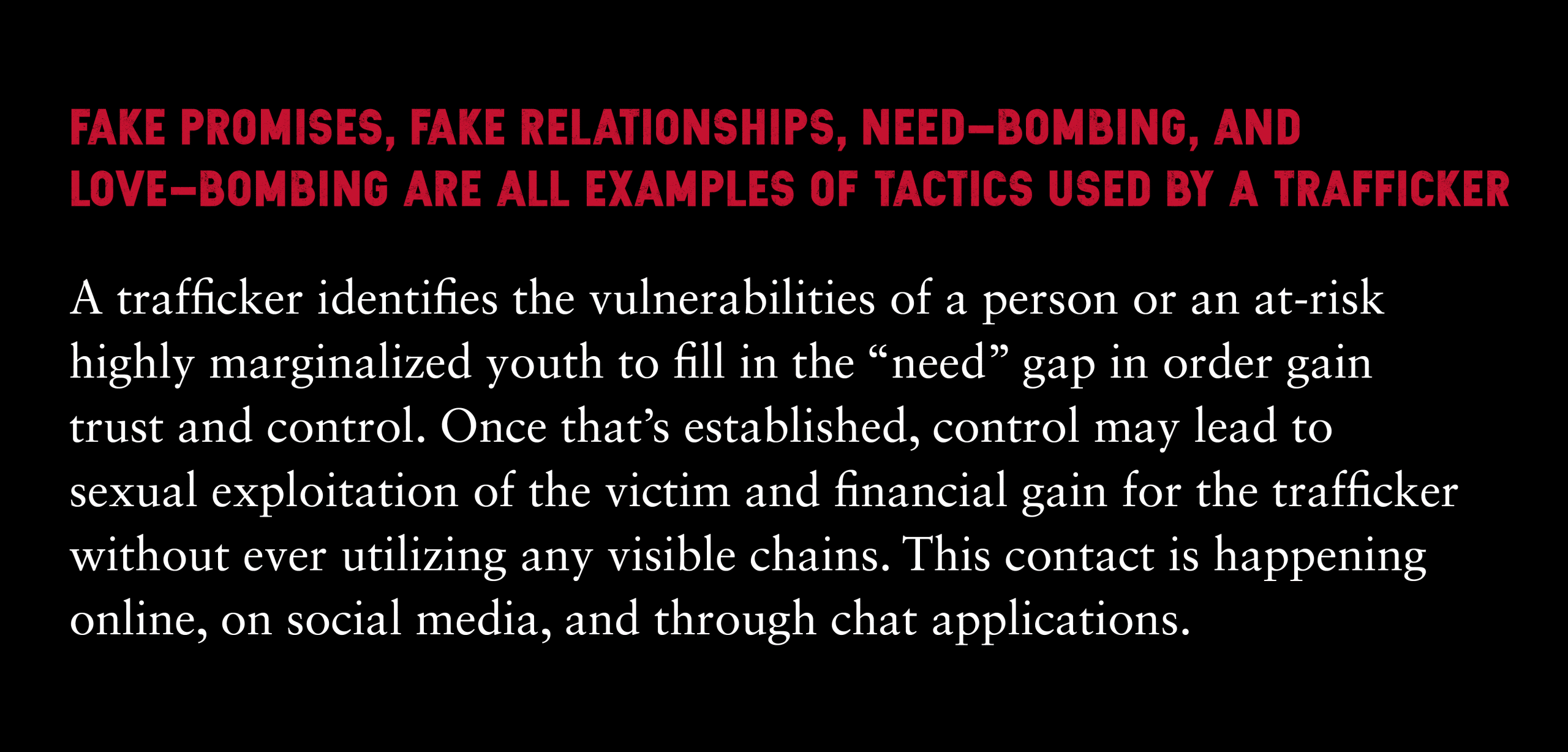Sex trafficking is a form of human trafficking that involves recruiting, moving, or holding victims for sexual exploitation purposes. Sex traffickers can coerce victims into providing sexual services by force or through threats, including mental and emotional abuse, and manipulation. (Source)
Traffickers can be both male and female, but most identify as male.
Sex trafficking is not just something that happens in the movies and far-away countries — it is all around us.
Learn more about other types of human trafficking.
How Does This Happen?
*Trigger warning* The following stories may be triggering for some readers. Discretion is advised.
The following examples illustrate how this can happen:
When I first heard of human trafficking, I thought about people in containers and people on boats who don’t speak the English language. I am born and raised here. I’m a Canadian. I’m safe, right?
I met him on social when I was 15. He told me he was 25. Slowly, he gained my trust and we met up. Being older, he took me to clubs downtown, and introduced me to other friends. He gave me alcohol and we partied. I started going out late but I was just having fun. I was using party drugs and eventually hard drugs. I didn’t know what I was being given. He lied to me. This is when it turned on me. I no longer had control.
One day, he told me I had to go to work for him, meeting people for sex. The drugs, partying, and shopping sprees had not been free. He told me I would keep some of the money I made, but he would hold on to it for me. This made me feel like I made a choice but I did not. He was much older and manipulated me. He put me in this position. He tricked me. I felt stupid.
When I told him I was done, he used what I told him about my friends and family against me. He threatened me. I felt trapped. I was offered more alcohol and drugs to numb myself. For two months, he told me where to go and when. It felt like two years. Everything I made went to him.
I finally found the courage to leave and got help. It’s been six years since.
Human trafficking can happen to you or someone you know.
I met him at a bus stop. I thought it was weird because he started talking to me, which doesn’t happen in Vancouver. It was like being back in my home town, except for the bus stop – my town was way too small for buses.
So we talked and we ended up exchanging snap accounts. He told me I was pretty and that I was his girlfriend. I believed him. He bought me nice clothes, designer bags, booze, and he even got me high. I finally felt like I belonged and I was so in love.
One day, he said he was out of money and that if we were going to have a life together, I had to work. He wanted me to have sex for money. I thought it would be just a few times, but he started keeping all my money and told me I couldn’t stop. He knew everything about me and threatened my family – and worse: to tell them what I was doing for money.
Eventually, he was arrested for something and I took my chance and ran away. I got help and now I’m rebuilding my life.
I was 15 when Sean first messaged me on Facebook. I was flattered when he told me how pretty I was. He was good looking, and older, which I thought was exciting.
Two weeks later, we met at the mall, and I was surprised that he didn’t look much like his picture, and that he was a lot older. I didn’t want to say anything in case it upset him, and there was no way I was going to tell my parents.
Despite feeling weird, I kept seeing Sean. He really liked me and wanted to be together all the time. He wanted me to skip school and stop seeing my friends. He even wanted me to call him every hour when we were apart. It started making me uncomfortable, but he was so nice, buying me presents all the time and telling me he loved me.
The first time Sean became really angry was when I forgot to call him on time, and things only got worse. One night, he told me that if I really loved him, I would sleep with his friend. He said the guy would pay us money, and I owed him for all the nice things he bought me.
I felt like I had no choice – I was scared, but I loved Sean, and he did buy me all those gifts.
I was so nervous and scared about having sex with some strange guy, so Sean gave me some pills to make things easier. Afterwards, I was so upset I told him it was over. That was the first time Sean hit me. He said that I was his, and I would do exactly what he told me to.
I felt like I had nowhere to turn – I was too ashamed and embarrassed to tell my family or my friends or ask for help. So I stayed with Sean for another two years. I had no idea that my family had reported me missing and were searching for me. I was forced into sex work, and I became addicted to drugs and alcohol.
I was finally able to escape and rebuild my life after I spoke to a doctor at the clinic. She referred me to a shelter and some organizations that helped me, and I reunited with my family.
Looking back, I wished I had trusted my instincts when I first met Sean and felt uncomfortable, and that I had reached out for help earlier.
I was introduced to these guys by a friend, who said they were offering a job making easy money. All I had to do was send photos of myself. I did and they paid me.
At first the photos were innocent, but then they asked me to do sexier shots. I hid my face and got my money.
This went on for a while, but I wanted to make some quick cash. We decided to meet, as they had another job offer for me. They said I could make a lot more money – that I was sexy and I could make a killing. I could set my own schedule and only work when I wanted, and I would be protected.
That’s when they started giving me booze and drugs to make it easier. They posted ads of me and determined when I worked and who I saw. They took a cut of my pay, and then took almost the rest, claiming they would save it for me. They didn’t care if I didn’t want to do something – they controlled what I did or didn’t do. I needed permission to buy new clothes or go to the corner store. All they cared about was money.
When I asked for my savings, they said I did not deserve it. When I wanted to leave, they said I needed to pay an exiting fee. I’m still struggling to get by, but I’m finally out.
Who is Most at Risk of Being Trafficked?
Many factors are at play, but traffickers most often target people who are:
- Young
- Female
- Have suffered abuse and violence
- Indigenous or from racialized communities
- 2SLGBTQ+
- Living with disabilities
- Migrants or new immigrants
- Struggling with money
- In foster care
- Unaware of their rights
- Working in remote areas
- Isolated from social supports
- Struggling with the dominant language
Traffickers prey on individuals who may be in challenging situations. This could be someone who is not in contact with their family, struggling with their identity, a survivor of abuse, or someone in desperate need of work or money. Whatever the reason, victims are often unaware that they’re even being groomed as traffickers are often expert manipulators.
Police-reported incidents of human trafficking show that 96% of victims are women and girls, 24% are girls under the age of 18, and 45% are women aged 18 to 24. (Source)
Resources
Canadian Human Trafficking Hotline
Get confidential help 24/7 in several languages by calling the Canadian Human Trafficking Hotline.
Call toll-free 1-833-900-1010 or chat online.
The Canadian Centre to End Human Trafficking
The Canadian Centre to End
Human Trafficking
1-833-900-1010
24/7 toll-free
Onyx
A free, confidential, voluntary support service for youth aged 13-18, of all genders and all orientations, who are, or are at risk of, being sexually exploited. Young people can access Onyx on their own, through a friend, family member, MCFD, other youth serving agencies, their school or the police.
Toll Free: 1-877-411-7532
Email: onyx@plea.bc.ca
Children of the Street
Children of the Street offers children, parents, caregivers, and service providers the information and practical tools they need to keep young people safe from all forms of sexual exploitation.
604-777-7510
info@childrenofthestreet.com
Family Services of Greater Vancouver
For over 25 years, Family Services has delivered victim services to women and children who have experienced domestic violence, sexual violence, and human trafficking.
Cybertip.ca
Cybertip.ca takes tips regarding the online sexual exploitation of children under 18 years old.
Crime Stoppers
Report crime anonymously to Crime Stoppers or call 1-800-222-8477.
Statistics Canada
Province of BC
The Office to Combat Trafficking
in Persons
1-888-712-7974
24/7 toll-free
octip@gov.bc.ca
VictimLinkBC
1-800-563-0808
24/7 toll-free
victimlinkbc@bc211.ca
Illuminate
Ending Human Trafficking
604-347-9500 or
toll-free 1-855-332-4283 24/7
connect@illuminateht.com
Vancouver Police Foundation
This awareness campaign is possible thanks to the generous support of the Vancouver Police Foundation.
